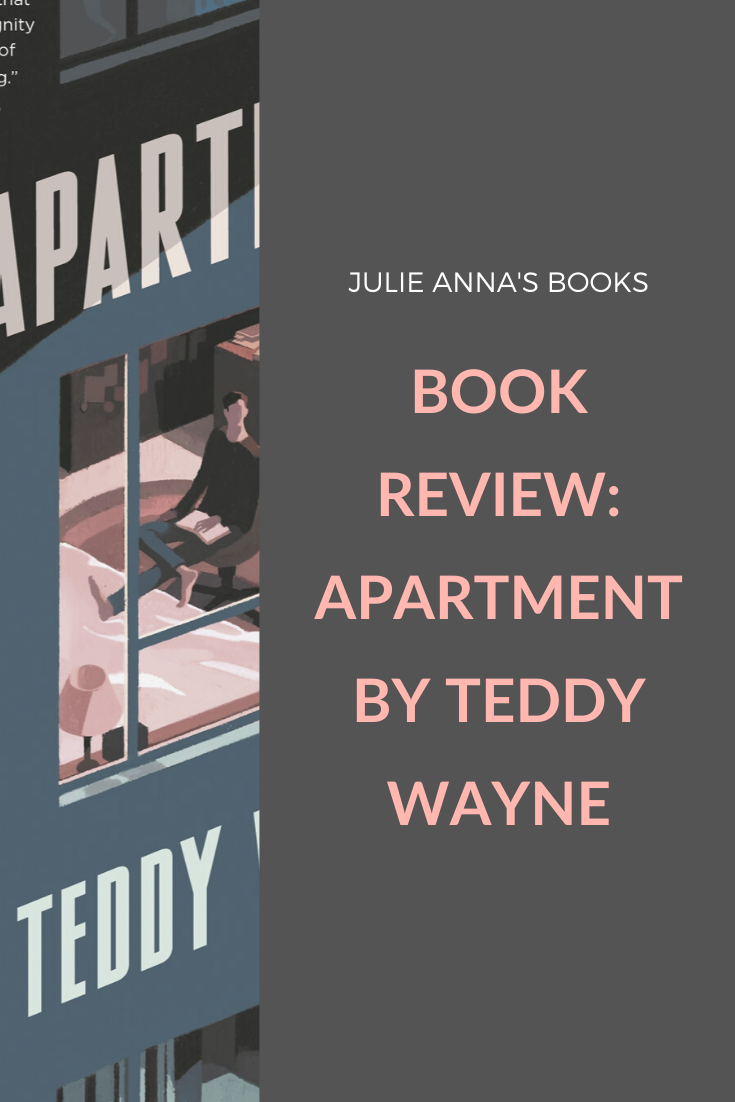Release Date: February 25th, 2020
Genre(s): Contemporary
Publisher: Bloomsbury
Pages: 208
Rating: 
Apartment is a character-driven story that revolves around two male characters currently in a writing program at Columbia University. There’s the unnamed narrator whose studies are paid for by his father, and living in an illegal sublet of a rent-stabilized apartment provided by his aunt. Then there’s Billy, a hard-working student from the Midwest struggling to make it financially. Out of guilt for his fortunes, the narrator offers his spare room to Billy. From there, their differences in work ethic, views, and values are more evident than ever, and their relationship ebbs and flows in a progressively uncomfortable way.
As a fan of character-driven stories like these, I was especially drawn to the differences in wealth and upbringing in these two characters. In some ways this mirrored my own personal experiences with those who have been raised in much different situations than I. There’s a lot to be said about what is never said in this book. In particular, the inability for either character to see the other’s views (or see why if it was completely disagreeable) created an interesting dynamic. It was a frustrating aspect at that since it made things unnecessarily uncomfortable between them. But this book does make for an interesting “fly on the wall” kind of novel, where you’re not really there to take sides.
Another less-discussed layer of this story was the kind of relationship Billy and the narrator shared. This is never something that is directly stated throughout the novel either, but the narrator’s feelings toward Billy are very complicated. This leaves a lot of speculation on the reader’s part of how to interpret those feelings, and how that impacted his behavior throughout the book. This was especially interesting due to the fact that this book is first-person to begin with, and yet the narrator isn’t specific about every detail. It feels as though the author is trying to show that the narrator isn’t aware of his own feelings, which was a very unique and realistic tactic given the storyline.
Something that I did find continually distracting throughout the novel was the word choice. I’ve seen this in novels before (especially in academia-themed ones), but the dialogue and narration oftentimes felt very unrealistic. Some examples I highlighted:
“I really admired how Olivia inhabits the child’s point of view in a way that feels authentic”
“The literary references felt overdetermined,” a student said.
“It evokes the tedium of office life”
Maybe it’s because I’m guilty of doing this myself that it stands out to me, but most people just don’t talk like this. Although I never mind looking up unfamiliar words, more common words make sense in dialogue, even in academic conversations. Why not use “portrays” instead of “inhabits?” Or “complicated” instead of “overdetermined?” In a sense, these words don’t even sound like they fit the context, which was even more distracting. The narrator himself even comments on using imitative fallacy (which he describes as not making the voice sound like the protagonist). And this may sound very nit-picky for the three examples that I chose, but this goes on for the whole book, and it’s not just the narrator that uses this complicated and unrealistic dialogue. Some more simplicity all around would have made this book much more engaging.
Overall, Apartment is a story with a simple plot, but a very complex execution. There was so much to piece together and so many ways to interpret the exact details of how and why the character’s relationships with each other changed over time. The one biggest drawback to me was the word choice and dialogue, but other than that, this is a very solid story. I would recommend Apartment to those who like to focus on a few characters or a small group and prefer their books to be a bit more open-ended.



